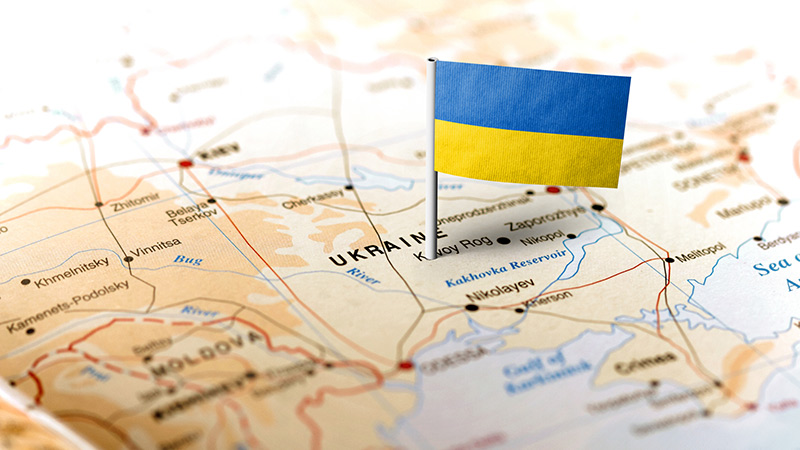
This content is for information and inspiration purposes only. It should not be taken as financial or investment advice. To receive personalised, regulated financial advice please consult us here at Elmfield Financial Planning in Padiham, Burnley, Lancashire.
Many of us have been saddened and shocked by the stories coming out of Ukraine recently. At Elmfield, we hope for a swift and peaceful resolution to the conflict. As economic sanctions have been imposed by the West on Russia, global markets have been turbulent. On 24th February, for instance, as news of the invasion broke out the FTSE 100 lost over 3% of its value. The next day, however, it had rebounded 3.9% as investors started to “price in” the long-term prospects of a Ukrainian-Russian war.
There was further instability soon afterwards as the US, UK and EU banned specific Russian banks from the SWIFT global financial system. Not long after, the US followed Canada and European states in banning Russian airlines from its airspace. UK-listed Russian stocks have taken their biggest-ever hit as traders tried to pre-empt further western sanctions and retaliation from the Kremlin. What does all of this mean for you, as an investor?
Remember your strategy
Our main message in this article is for investors not to panic, and to stay true to your long term investment strategy agreed with your financial planner.
Few predicted events that are currently unfolding. However, when you first agreed your portfolio strategy with your financial planner, you likely discussed key questions such as:
- How long do you want to invest for?
- How would you feel if your investments suddenly fall dramatically tomorrow?
The first question concerns your investment horizon – how long you want to hold your investments for. A short period of time (e.g. less than 5 years) leads most people to take a cautious approach with their investment strategy.
After all, there is the possibility of one or more market crashes in that time, and not much time for your investments to recover. As such, “cautious” investments with a lower volatility risk (and lower potential return) are often more attractive. These allow for some capital growth, whilst limiting the damage from a potential bear run in the markets.
A longer investment horizon (e.g. 20-30 years), however, can allow you to be more “aggressive” with your investments – selecting opportunities within higher volatility risk, but also the chance of higher returns in the long run.
Keep a long term perspective
The second question, above, concerns your risk tolerance. Again, cast your mind back to your conversations with your financial adviser, during which you should have addressed how you feel about a market fall.
For many people, investment volatility is simply too much to stomach and their main priority is to maintain financial stability. This attitude is common amongst people in retirement, when the goal is to preserve wealth and use it for an income – not to grow wealth.
For others, however, there is a long stretch of time in front of them – e.g. young people starting a pension whilst still early in their careers. Here, a higher risk appetite is common since there is 30+ years for investments to recover and surpass their losses.
Bear in mind that equity markets, historically, have weathered many wars and financial crises – yet continued to deliver returns for investors in the long run. Consider the road that the S&P 500 has been on, for instance. In 1950, the index stood at 208. By December 2021, however, it had risen to 4,804 – near its all-time high.
Over the decades, many setbacks occurred including the Kennedy Slide (1962), the 1973-74 stock market crash, Black Monday in 1987, Black Wednesday in 1992, the Dot-com bubble in 2000, the 2008-9 Financial Crash and the 2020 Covid Crash. There were decades of Cold War instability, humanitarian interventions and wars in the Middle East. However, investors who kept a long-term perspective – rather than leaving the markets out of panic – likely did very well
This is not to say that all stock markets always move upwards. A financial planner is still useful to help you examine different equity options and build a robust asset mix for your portfolio. Yet it is good to remember that financial instability from war is nothing new.
Avoid timing the markets
Russia is one of the world’s leading oil and gas producers. Europe, in particular, relies heavily on energy exports from Russia. Ukraine, moreover, is a significant global supplier of agricultural goods such as wheat.
War in the region, therefore, may tempt some investors to try and “outguess” the markets – e.g. via stock picking. At Elmfield, we urge you to take great care. Attempting this even during times of relative economic stability is challenging enough. With the added uncertainties of war and sanctions, however, “good bets” are even harder to identify on a consistent basis.
Again, we encourage investors to stay true to their long-term investment strategy rather than trying to build wealth over years of consistent stock picking. Even most active fund managers do not achieve this considerable feat (beating an index benchmark) over 5, 10 or more years. For most investors, a better approach will be “re-balancing” a portfolio once or twice per year, to make sure the asset mix still reflects the prevailing long term strategy.
Invitation
If you are interested in starting a conversation about your own financial plan or investments, then we’d love to hear from you. Please contact us to arrange a free, no-commitment consultation with a member of our team here at Elmfield Financial Planning in Padiham, Burnley, Lancashire.
Reach us via:
T: 01282 772938

